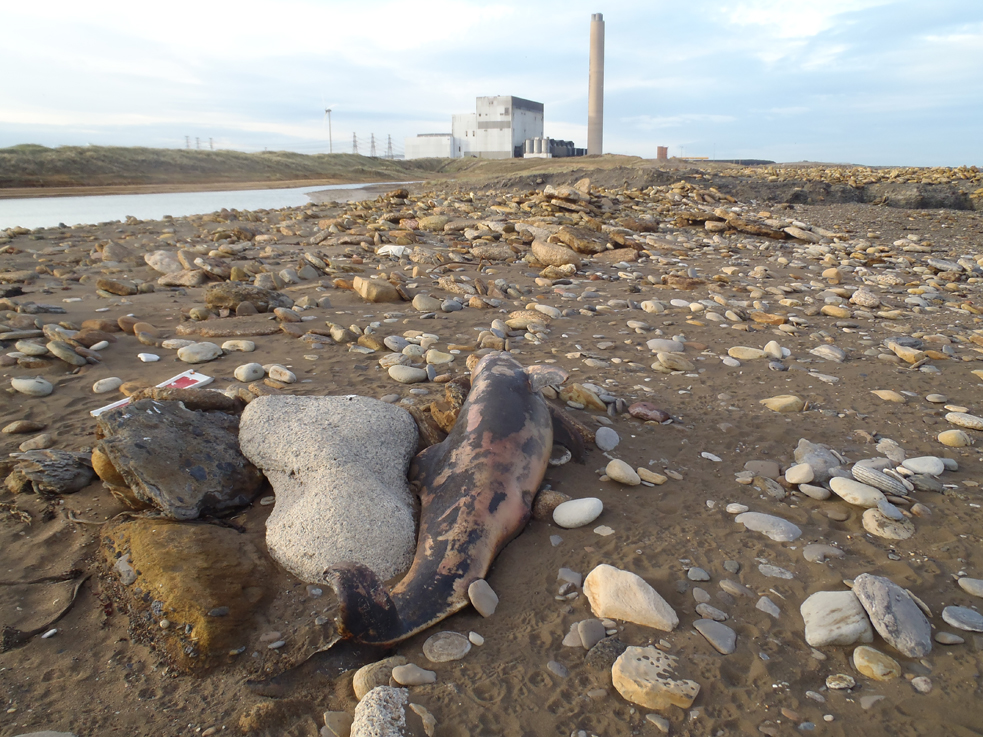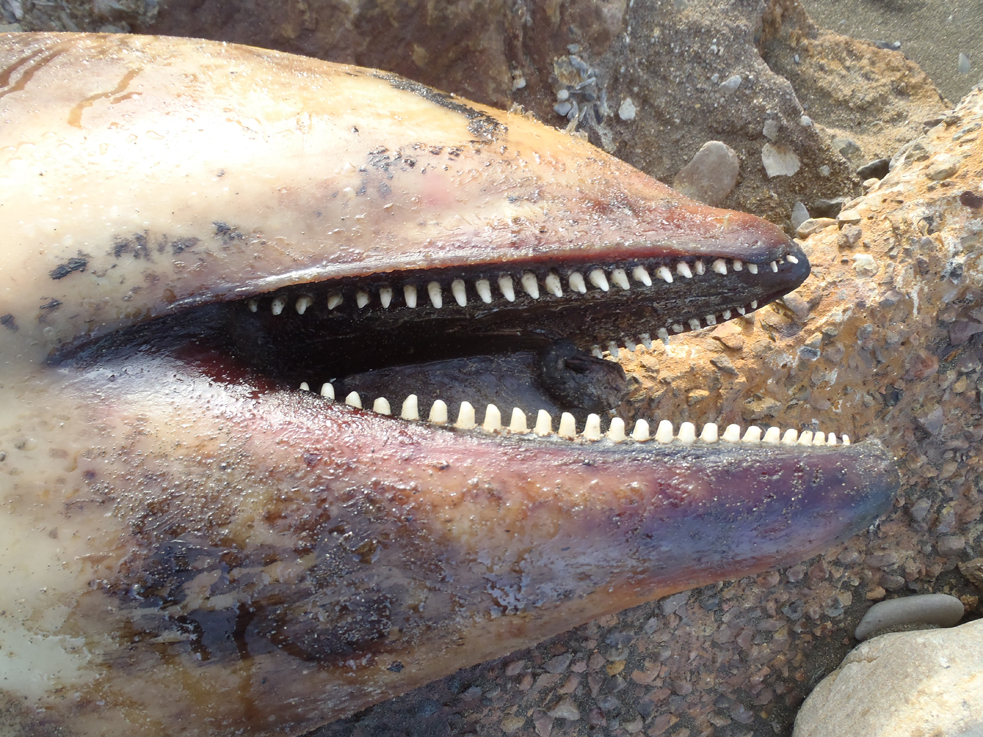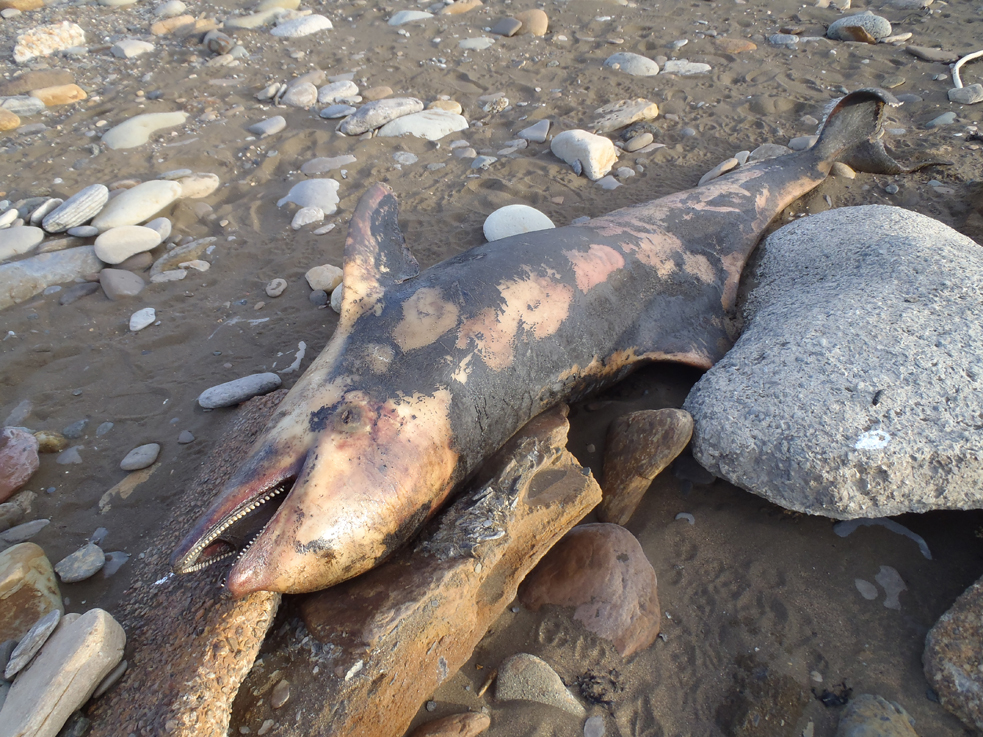Another dead white-beaked dolphin (Lagenorhynchus albirostris) was reported found on the beach by Lynemouth powerstation on Sunday 27 October. Pictures indicated that the animal had likely been on the beach for about 10 days. I went to the site on Wednesday to investigate the dolphin. It was male, 2.65m long, but unfortunately too decomposed for collection and to allow a useful post mortem analysis. However, samples of skin, blubber and muscle were taken for genetic and pollution analyses, and teeth for aging. It had 26 pairs of teeth in each jaw which is consistent with the 22-28 pairs normally found in the species. The animal had significant tooth wear indicating that is was an older animal. By preparing teeth and reading growth layers it is possible to age the animal and a white-beaked dolphin may live for 40-45 years.
Why do cetaceans (porpoises, dolphins and whales) strand? There are different reasons, most likely a combination of factors, and it may differ depending on whether the animal was alive or dead when stranded. Live animals may strand due to navigational errors especially in areas with large tidal range and gently sloping beaches where the water may disappear quickly on the ebbing tide. Stormy weather and possibly magnetic anomalies may also contribute. However, it is more likely that the animal was sick or had been injured after interaction with fishing gear or a boat. If the animal is unwell and weak it may seek shelter in a shallow bay and beach itself to help keep the blow hole above water to allow it to breath. Animals found dead on beaches may have suffocated in fishing gear and then been dumped by the fisher at sea when the gear was hauled. In such cases there is usually evidence in the form of netmarks on the dorsal and/or pectoral fins, tail flukes or the snout. If the animal had been hit by a boat there is usually some form of physical trauma, an impact wound and/or bleeding.
There are also cases of mass strandings when whole groups of up to several hundred dolphins or whales strand together. Again there may be different factors responsible such as those mentioned above and others e.g. biotoxins (toxic algae blooms) that may make a whole group of animals sick and lead to stranding. Military sonar has been linked to strandings and deaths of several beaked whale species where the sonar has affected the whales’ diving behaviour and caused decompression-related problems (similar to the “bends” that can affect human divers) when they return to the surface after deep dives. In some other species e.g. pilot and sperm whales it may also be the social bonds that may contribute where perhaps one sick animal strand and several other come to the aid the sick animal and also strand in the process. In most cases it is likely a combination of factors that are the cause for the stranding.
For information on how to report strandings in England see: http://ukstrandings.org/how-to-report-a-stranding/
Information from the strandings provides a picture of what species are found in UK waters and show geographic and seasonal distribution. The animals that that undergo post-mortem analyses provide information on causes of death, disease, contaminants, reproductive patterns and diet of the cetaceans living around the UK.
We collaborate with the UK Cetaceans Strandings Investigation Programme (http://ukstrandings.org/) and acts as regional contact that can respond to strandings. Depending on the size of the animal and degree of decomposition, the dead animals are either collected, stored in the freezer room at the Dove Marine Laboratory and later post mortem analysed, or post mortem sampled on the beach.
On a more positive note, there was a live stranding of a harbour porpoise (Phocoena phocoena) on Whitley Bay Beach in on Tuesday morning 29 October. This report came from Marcus Jackson, North Tyneside council coastal warden. The stranding was reported to the British Divers Marine Life Rescue (http://www.bdmlr.org.uk/) who are trained in dealing live stranded cetaceans. When BDMLR came to the beach members of the public had already refloated the animal. This may have had a successful outcome for the animal but unless correct procedures are followed it is possible to cause more harm than help. So unless you have been trained as a marine mammal medic, please call for expert help if you find a live stranded cetacean.
For more information please contact: Dr Per Berggren (per.berggren@ncl.ac.uk)
Many thanks to Martin Kitching (http://www.northernexperiencewildlifetours.co.uk/) for reporting the white-beaked dolphin stranding.



